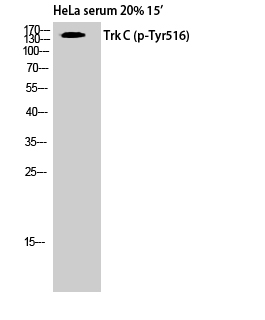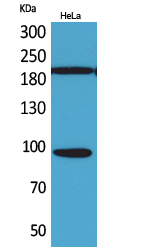Trk C (phospho Tyr516) Polyclonal Antibody
- Catalog No.:YP0800
- Applications:WB;IHC;IF;ELISA
- Reactivity:Human;Mouse;Rat
- Target:
- Trk C
- Fields:
- >>Calcium signaling pathway;>>Neurotrophin signaling pathway;>>Central carbon metabolism in cancer
- Gene Name:
- NTRK3
- Protein Name:
- NT-3 growth factor receptor
- Human Gene Id:
- 4916
- Human Swiss Prot No:
- Q16288
- Mouse Gene Id:
- 18213
- Mouse Swiss Prot No:
- Q6VNS1
- Rat Gene Id:
- 29613
- Rat Swiss Prot No:
- Q03351
- Immunogen:
- The antiserum was produced against synthesized peptide derived from human Trk C around the phosphorylation site of Tyr516. AA range:482-531
- Specificity:
- Phospho-Trk C (Y516) Polyclonal Antibody detects endogenous levels of Trk C protein only when phosphorylated at Y516.
- Formulation:
- Liquid in PBS containing 50% glycerol, 0.5% BSA and 0.02% sodium azide.
- Source:
- Polyclonal, Rabbit,IgG
- Dilution:
- WB 1:500 - 1:2000. IHC 1:100 - 1:300. ELISA: 1:10000.. IF 1:50-200
- Purification:
- The antibody was affinity-purified from rabbit antiserum by affinity-chromatography using epitope-specific immunogen.
- Concentration:
- 1 mg/ml
- Storage Stability:
- -15°C to -25°C/1 year(Do not lower than -25°C)
- Other Name:
- NTRK3;TRKC;NT-3 growth factor receptor;GP145-TrkC;Trk-C;Neurotrophic tyrosine kinase receptor type 3;TrkC tyrosine kinase
- Observed Band(KD):
- 160kD
- Background:
- This gene encodes a member of the neurotrophic tyrosine receptor kinase (NTRK) family. This kinase is a membrane-bound receptor that, upon neurotrophin binding, phosphorylates itself and members of the MAPK pathway. Signalling through this kinase leads to cell differentiation and may play a role in the development of proprioceptive neurons that sense body position. Mutations in this gene have been associated with medulloblastomas, secretory breast carcinomas and other cancers. Several transcript variants encoding different isoforms have been found for this gene. [provided by RefSeq, Jul 2011],
- Function:
- alternative products:Additional isoforms seem to exist,catalytic activity:ATP + a [protein]-L-tyrosine = ADP + a [protein]-L-tyrosine phosphate.,function:Receptor for neurotrophin-3 (NT-3). This is a tyrosine-protein kinase receptor. Known substrates for the trk receptors are SHC1, PI-3 kinase, and PLCG1. The different isoforms do not have identical signaling properties.,PTM:Ligand-mediated auto-phosphorylation.,similarity:Belongs to the protein kinase superfamily. Tyr protein kinase family. Insulin receptor subfamily.,similarity:Contains 1 protein kinase domain.,similarity:Contains 2 Ig-like C2-type (immunoglobulin-like) domains.,similarity:Contains 2 LRR (leucine-rich) repeats.,subunit:Exists in a dynamic equilibrium between monomeric (low affinity) and dimeric (high affinity) structures. Binds SH2B2. Interacts with SQSTM1 and KIDINS220.,tissue specificity:Widely expressed but mainly i
- Subcellular Location:
- Membrane; Single-pass type I membrane protein.
- Expression:
- Widely expressed but mainly in nervous tissue. Isoform 2 is expressed at higher levels in adult brain than in fetal brain.
- June 19-2018
- WESTERN IMMUNOBLOTTING PROTOCOL
- June 19-2018
- IMMUNOHISTOCHEMISTRY-PARAFFIN PROTOCOL
- June 19-2018
- IMMUNOFLUORESCENCE PROTOCOL
- September 08-2020
- FLOW-CYTOMEYRT-PROTOCOL
- May 20-2022
- Cell-Based ELISA│解您多样本WB检测之困扰
- July 13-2018
- CELL-BASED-ELISA-PROTOCOL-FOR-ACETYL-PROTEIN
- July 13-2018
- CELL-BASED-ELISA-PROTOCOL-FOR-PHOSPHO-PROTEIN
- July 13-2018
- Antibody-FAQs
- Products Images

- Western Blot analysis of HELA cells using Phospho-Trk C (Y516) Polyclonal Antibody

- Immunohistochemistry analysis of paraffin-embedded human brain, using Trk C (Phospho-Tyr516) Antibody. The picture on the right is blocked with the phospho peptide.

- Western blot analysis of lysates from HeLa cells treated with serum 20% 15', using Trk C (Phospho-Tyr516) Antibody. The lane on the right is blocked with the phospho peptide.

